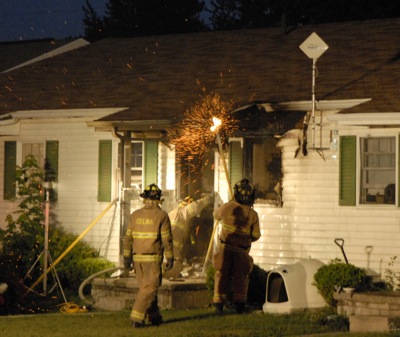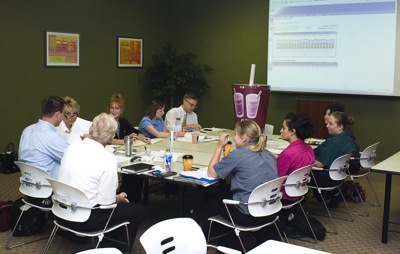Wednesday, July 28th, 2010
Controversy surrounds wind energy tax law
By Shelley Grieshop
A recently-passed law that gives Ohio's county commissioners the power to authorize property tax exemptions to wind turbine developers could impact local school districts.
Senate Bill 232 gives exclusive power to county commissioners to accept regular property taxes from renewable energy developers or provide them incentives by collecting substantially smaller, annual payments.
Schools in the Grand Lake area count on property taxes to make ends meet and could be financially impacted by the incentives, three local superintendents learned at a meeting Tuesday in the Mercer County commissioner's office.
Speaking on the issue were Josh Hahn and John Leutz of the County Commissioners Association of Ohio, who are on a road trip this month to educate county commissioners statewide about the new law and the responsibilities that fall in their lap. Present at the commissioners'' meeting were superintendents Andy Smith of the Mercer County Educational Service Center, Greg Puthoff of Parkway Local School and Rod Moorman of St. Henry Consolidated Local Schools.
It was noted that local interest in wind turbine projects has been focused in the Rockford, Celina and St. Henry areas.
Hahn and Leutz didn't advise commissioners how to proceed if a tax abatement offer is requested by a wind turbine developer. Instead, they told commissioners and educators to analyze the economic impact before making a decision.
"Start crunching the numbers," Leutz told them.
Commissioner Bob Nuding agreed they'd "have to come up with a decision that's in the best interest of each" - the county and the schools.
The property tax exemptions are part of the state's Payment in Lieu of Taxes (PILOT) program, which allows commissioners to indefinitely accept annual payments of $6,000 to $8,000 in property taxes from renewable energy developers who meet requirements.
The exact amount collected would be based on megawatt capacity and the number of Ohio workers involved in the construction phase, Hahn said.
Commissioners also can declare their county an Alternative Energy Zone, which would automatically approve all applicable projects into the PILOT program, or they can consider each project individually. Other options in Senate Bill 232 allow commissioners to draw additional sums of $1,000 to $3,000 to benefit the county's general fund, as well as requesting funds to repair roads to construction sites.
To qualify for the tax abatement, developers must submit an application to the Power Siting Board by Dec. 31, 2011, and go online with their operation by Jan. 1, 2013, according to the new law.
The issue has become a hot topic in Van Wert County, where Heartland Wind of Illinois is proposing to construct up to 175 wind turbines. The wind farm would span into Paulding County on 40,500 acres of land and have a combined generating capacity of approximately 350 megawatts.
Approximately 140 landowners plan to provide about 17,000 acres of leased property to Heartland, according to the Ohio Power Siting Board, which is expected to rule on the company's application Aug. 23.
Commissioners in Van Wert County have not decided what type, if any, tax abatements to offer the developer.
Currently, no alternative energy projects such as wind turbine farms have been filed or are pending in Mercer or Auglaize counties, according to the Public Utilities Commission Office (PUCO). However, several wind test towers have been erected locally, including two in the St. Henry area.
Although Mercer County doesn't have ideal wind capacity, it is located close to Toledo Edison and Allegheny Power grids for efficient electrical generation, Hahn said.
"That's why Ohio is the opportune place for developers," he said.
Another factor pushing the alternative energy frenzy is a state law that requires utility companies to procure at least 25 percent of their electricity supply from alternative energy sources by 2025.
Hahn and Leutz said wind turbine developers are aggressively looking for project sites to meet deadlines set for the tax abatements.
"Developers can get back about 30 percent of their cost," Hahn said.



